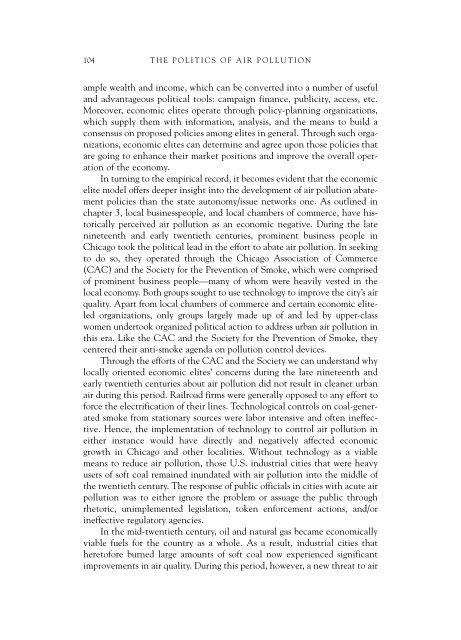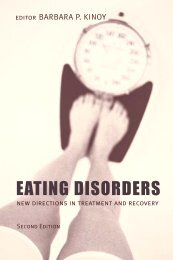GEORGE A. GONZALEZ - fieldi
GEORGE A. GONZALEZ - fieldi
GEORGE A. GONZALEZ - fieldi
You also want an ePaper? Increase the reach of your titles
YUMPU automatically turns print PDFs into web optimized ePapers that Google loves.
104THE POLITICS OF AIR POLLUTIONample wealth and income, which can be converted into a number of usefuland advantageous political tools: campaign finance, publicity, access, etc.Moreover, economic elites operate through policy-planning organizations,which supply them with information, analysis, and the means to build aconsensus on proposed policies among elites in general. Through such organizations,economic elites can determine and agree upon those policies thatare going to enhance their market positions and improve the overall operationof the economy.In turning to the empirical record, it becomes evident that the economicelite model offers deeper insight into the development of air pollution abatementpolicies than the state autonomy/issue networks one. As outlined inchapter 3, local businesspeople, and local chambers of commerce, have historicallyperceived air pollution as an economic negative. During the latenineteenth and early twentieth centuries, prominent business people inChicago took the political lead in the effort to abate air pollution. In seekingto do so, they operated through the Chicago Association of Commerce(CAC) and the Society for the Prevention of Smoke, which were comprisedof prominent business people—many of whom were heavily vested in thelocal economy. Both groups sought to use technology to improve the city’s airquality. Apart from local chambers of commerce and certain economic eliteledorganizations, only groups largely made up of and led by upper-classwomen undertook organized political action to address urban air pollution inthis era. Like the CAC and the Society for the Prevention of Smoke, theycentered their anti-smoke agenda on pollution control devices.Through the efforts of the CAC and the Society we can understand whylocally oriented economic elites’ concerns during the late nineteenth andearly twentieth centuries about air pollution did not result in cleaner urbanair during this period. Railroad firms were generally opposed to any effort toforce the electrification of their lines. Technological controls on coal-generatedsmoke from stationary sources were labor intensive and often ineffective.Hence, the implementation of technology to control air pollution ineither instance would have directly and negatively affected economicgrowth in Chicago and other localities. Without technology as a viablemeans to reduce air pollution, those U.S. industrial cities that were heavyusers of soft coal remained inundated with air pollution into the middle ofthe twentieth century. The response of public officials in cities with acute airpollution was to either ignore the problem or assuage the public throughrhetoric, unimplemented legislation, token enforcement actions, and/orineffective regulatory agencies.In the mid-twentieth century, oil and natural gas became economicallyviable fuels for the country as a whole. As a result, industrial cities thatheretofore burned large amounts of soft coal now experienced significantimprovements in air quality. During this period, however, a new threat to air









